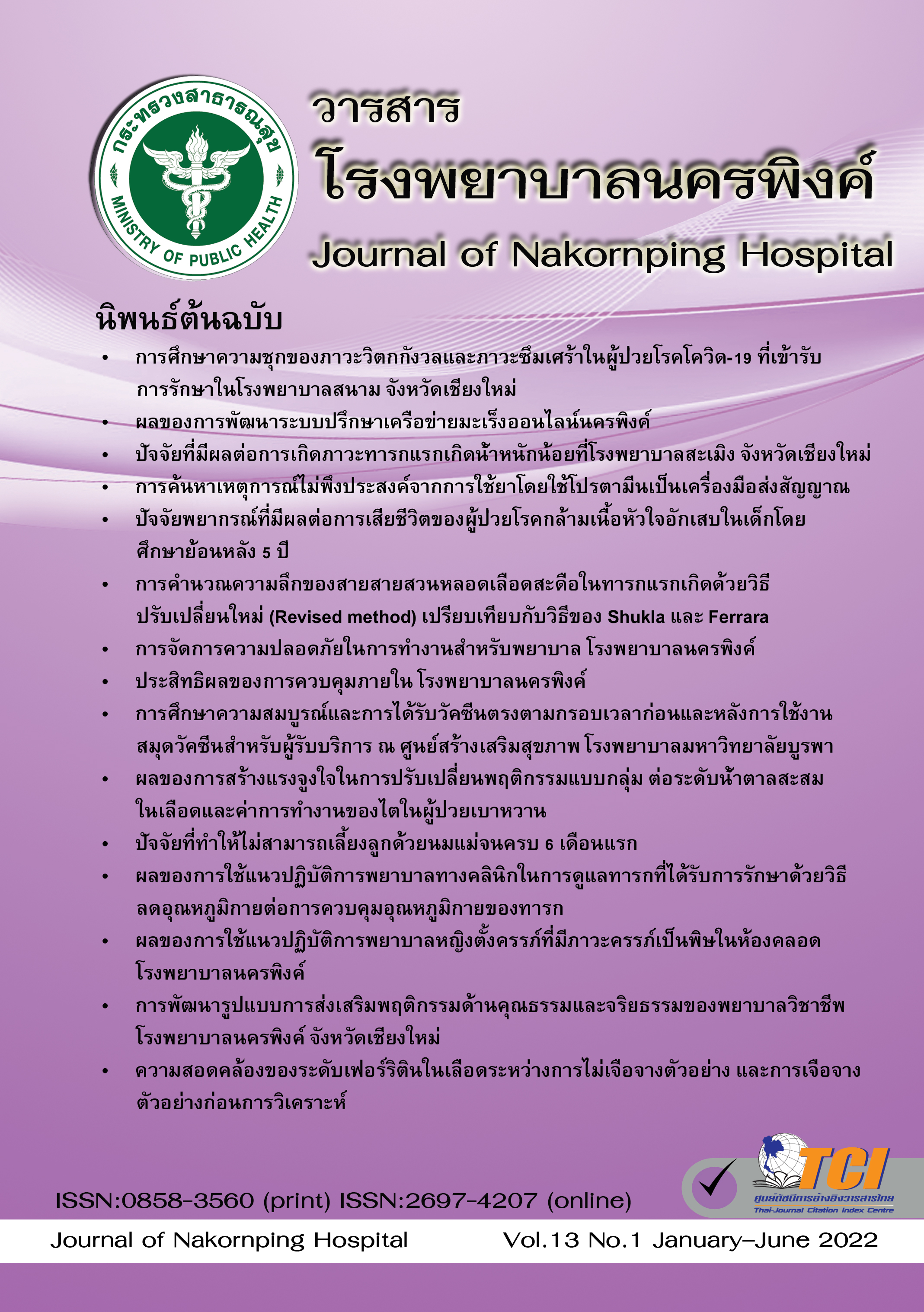The effectiveness of internal control in Nakornping Hospital
Keywords:
Internal Control, Effectiveness, Nakornping HospitalAbstract
This evaluation research is a Quantitative Research. The objective is to study were to 1) study knowledge and understanding about internal control 2) study internal control situation and evaluation of the internal control system of Nakornping Hospital 3) study the relationship between internal control system and internal control effectiveness of Nakornping Hospital and 4) study attitudes about the development of internal control system of Nakornping Hospital personnel. Collect data using questionnaires. The sample group was 340 personnel of Nakornping Hospital, divided into 73 supervisors and 267 officers. Data were analyzed by using descriptive statistics and hypothesis was tested using reference statistics such as T-test analysis. One-way Anova analysis and correlation using Pearson’ s correlation coefficient at 0.05 level of significance.
The results found that the overall personnel had a moderate level of understanding about internal control. The supervisors of different personal factors in terms of position and working life have different knowledge and understanding of internal control. The officers of different positions and types of officers have different knowledge and understanding of internal control. The internal control situation of Nakornping Hospital from the assessment of the internal control system, it is at a very good level according to the Internal Control Standard for Government Agency of the Ministry of Finance. The supervisors of different ages have different opinions on internal control system evaluation. Most of the personnel opinion that internal control had the most impact on compliance with laws, rules and regulations and the internal control system was positively correlated with the effectiveness of internal control. Most of the personnel agree with the development of internal control systems. The supervisors of different personal factors had no different attitude about internal control system development. The officers of different age, officer type, position and working life have different attitudes about internal control system development statistically significant at the 0.05 level.
References
State Audit Office of the Kingdom of Thailand. Regulations of the State Audit Commission on the Determination of Internal Control Standards 2001. Bangkok: Kurusapa Printing Ladphrao; 2001.
Ministry of Finance. Internal Control Standard for Government Agency 2018 [Internet]. Bangkok: Ministry of Finance; 2018. Available from: https://www.dlt.go.th/site/ia/m-download/9045/
Office of the Permanent Secretary Ministry of Public Health, Office of Internal Audit. Criteria for Evaluating the Efficiency of the Internal Electronic Control System in 5 Dimensions Fiscal Year 2021 [Internet]. Nonthaburi: Office of Internal Audit; 2021. Available from: http://www.sm-hospital.com/v1/N1/dirN/78
Nakornping Hospital. Nakornping Hospital Strategic Plan 2019 - 2023. Chiang Mai: Nakornping Hospital; 2019.
Ngaosila O. Internal Control and Performance [dissertation]. Bangkok: Dhurakit Pundit University; 2019.
Khangrit T, Sukwatanasinit K. The effect of Internal Control on Efficiency of Performance of Government Officers of Finance Department. The Nationnal Academic Research Conference 7th "University Social Engagement as a Driving Force for Thailand 4.0"; 2017 Jul 6-7; Faculty of Management Science, Nakhon Ratchasima Rajabhat University. Nakhon Ratchasima: Nakhon Ratchasima Rajabhat University; 2017. p. 776-87.
Burana C, Distkaew K, Laohamedani W. An Implementation of An Internal Control System to be Efficient in Accordance with An International Standards: A Case Study of a Primary Public Schools in Chiang Mai Province. Faculty of Business Administration, Maejo University (MJBA). 2019;1(2):1-19.
Duangjan S. The Good Internal Control System and Good Governance Affect Performance of Savings Cooperatives in Thailand [dissertation]. Bangkok: Sripatum University; 2017.
Rathachatranon W. Determining an Appropriate Sample size for Social science Research: The Myth of using Taro Yamane and Krejcie & Morgan Method. Journal of Interdisciplinary Research: Graduate studies. 2019;8(1):11-28.
Ketsingh W. Average and Interpretation : Simple things that can sometimes be missed. Educational Research News. 1995;18(3):8-11.
Yomsawad J. The Effectiveness of Internal Control of Chumphon Khet Udomsakdi Hospital. Department of Health Service Support Journal. 2017;13(1):60-76.
Thungsook S, Khamjai K. The Internal Control Evaluation and The Internal Control System Development Approach of Municipalities in Chiang Mai province. Lampang Rajabhat University Journal. 2018;7(2):141-54.
Office of the Permanent Secretary Ministry of Public Health, Office of Internal Audit. Electronic Internal Audit: Assessment results from the year past [Internet]. Nonthaburi: Office of Internal Audit; n.d. Available from: https://iad.moph.go.th/main/eia/
Office of the Permanent Secretary Ministry of Public Health, Office of Internal Audit. Civil Service Inspection and Supervision in normal cases, Health Region1, 2nd round of Fiscal Year 2021 [Internet]. Nonthaburi: Office of Internal Audit; 2021. Available from: http://www.rh1.go.th/web/index.php
Human Resource Management Unit Nakornping Hospital. Number of personnel of Nakornping Hospital. Chiang Mai: Nakornping Hospital; 2022.
Imros A. Factors Affecting the Efficiency of Internal Control in Finance Accounting : Case Study of Government Hospital in Bangkok [dissertation]. Bangkok: Sripatum University; 2018.
Downloads
Published
How to Cite
Issue
Section
License
Copyright (c) 2022 Nakornping Hospital

This work is licensed under a Creative Commons Attribution-NonCommercial-NoDerivatives 4.0 International License.
The articles that had been published in the journal is copyright of Journal of Nakornping hospital, Chiang Mai.
Contents and comments in the articles in Journal of Nakornping hospital are at owner’s responsibilities that editor team may not totally agree with.



